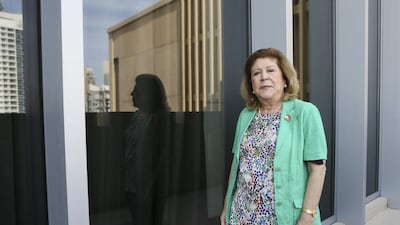At the helm of her family’s logistics company Gezairi Transport, Mona Bawarshi is one of the most successful women in Lebanon. Her father, the late Abdul Salam El Gezairi, started up the company in 1945 in a small customs clearing office in Beirut. Ms Bawarshi, 68, now employs more than 500 people throughout Turkey, Cyprus, Lebanon, Syria, Iraq and Jordan, who are directed from the head office in Beirut.
How do you spend your weekends?
Entertaining the kids and the grandkids, but mainly I like to read a lot of self-help books. I find them entertaining. I have a book that is my mantra now – No More Regrets: 30 Ways to Find Happiness and Greater Meaning in Your Life by Marc Muchnick. I also like to read articles on management and education, and I love to surf the net.
How did you become a chief executive?
I am an only child and was raised to be the next owner of the company. When I started out (in 1968), just after finishing my degree in business administration at the American university of Beirut, my father was the chief executive. I was raised by a great lady, my mother, who was always telling me that this is my future and I have to be successful. She put that determination in me. I took over the company very slowly because my father was such a dictator. But slowly I gained his trust. We didn’t get on very smoothly when he was alive, but I am carrying the legacy on as far as I can. The company has become bigger and I’m passing it to my kids now. One of my girls is taking over HR, one the ship agency business, and my son is looking after all the overseas offices. I hope I’m not giving them the very bad times that my father gave me. But so far, so good. I’m waiting to what the future holds – time will tell which one will take over from me.
What was the lowest point in your career?
When I used to quarrel with my father. [Also] the wars we passed through were extremely demoralising. The war in Lebanon, then the war around Lebanon, the offices that crumbled, and then to start again … these were tough times. The Middle East is passing through very tough times now and we have to survive. In the transport business, of course we’re affected by what’s going on in Syria, because you can’t pass through there.
What advice would you offer others starting out in your business?
Be on the lookout for new things all the time. When I was starting out, the container business was also starting, but it was very difficult to introduce containers to the Arab world. People wanted to see the cargo – they can’t ship the cargo from Beirut to Baghdad without opening the container – and they found it ridiculous to transport all these containers to Baghdad and bring them back again. “What is this? This is very silly,” people would say. I advise people to embrace new inventions, they are good for us. Why not use driverless cars? We don’t yet know a lot about them, but I’m sure there are going to be a lot of rules because there are so many rules for airplanes. I can only hope that my company in the future will one day embrace those types of things.
What do you have on your desk at work?
A list of our employees, a list of where we stand financially with the banks, some brochures and papers regarding societies, associations and charities I belong to, and copies of reports – perhaps some employees have taken a trip somewhere and they’re reporting back, that sort of thing.
What is your most indulgent habit?
Walking, swimming, and having me-time.
What can’t you live without?
My kids, I suppose. As an only child, I embrace the fact that we are many now. I have three children, ages 35, 33 and 30, who all work for the company. I also have grandchildren – two boys, ages five and two, and a baby girl.
How do you achieve a work-life balance?
I have a book in my bag that I keep all my appointments in. I write in appointments I have with the doctor, business people, a movie, an invitation out – I write everything in that very small book. That’s my time management system.
If you could swap jobs with anyone, who would it be and why?
Somebody in the movie industry. I’m fascinated by movies. And the industry itself has moved forwards so much. I’d love to learn the skills of fine-tuning the acting. But I’ve never done any drama in my life – only appreciation of drama. I am a movie watcher.
What’s your go-to gadget?
A DVD of a movie.
business@thenational.ae
Follow The National's Business section on Twitter

